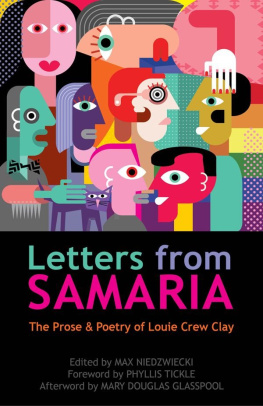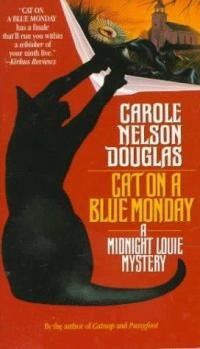Letters from
SAMARIA
The Prose & Poetry of Louie Crew Clay
19742014
Edited by MAX NIEDZWIECKI
Foreword by PHYLLIS TICKLE
Afterword by MARY DOUGLAS GLASSPOOL

Copyright 2015 by Louie Crew Clay
All rights reserved. No part of this book may be reproduced, stored in a retrieval system, or transmitted in any form or by any means, electronic or mechanical, including photocopying, recording, or otherwise, without the written permission of the publisher.
Unless otherwise noted, the Scripture quotations contained herein are from the New Revised Standard Version Bible, copyright 1989 by the Division of Christian Education of the National Council of Churches of Christ in the U.S.A. Used by permission. All rights reserved.
Morehouse Publishing, 19 East 34th Street, New York, NY 10016 Morehouse Publishing is an imprint of Church Publishing Incorporated.
www.churchpublishing.org
Cover art courtesy of Thinkstock
Cover design by Laurie Klein Westhafer
Interior design and typesetting by Beth Oberholtzer Design
For a complete listing of publications by Louie Crew Clay,
see http://www-rci.rutgers.edu/~lcrew/pubs.html.
Library of Congress Cataloging-in-Publication Data
A catalog record of this book is available from the Library of Congress.
ISBN-13: 978-0-8192-3219-9 (pbk.)
ISBN-13: 978-0-8192-3220-5 (ebook)
Louie Crew Clay:
To Ernest Clay:
Grow old along with me.
The best is yet to be.
Max Niedzwiecki:
To Albert Ruesga,
the love of my life.
Acknowledgments
To Nancy Bryan, whose encouragement and enthusiasm have made this volume possible.
To Integrity USA, in appreciation for over forty years of ministry and activism.
Our adversaries: We struggle in a holy embrace towards Judgment Day based not on how right we are but on how much we love one another. Thank you. Bless you.
It was the best of times, it was the worst of times, it was the age of wisdom, it was the age of foolishness, it was the epoch of belief, it was the epoch of incredulity, it was the season of Light, it was the season of Darkness, it was the spring of hope, it was the winter of despair.
And it is also one of the most famous and often-cited sentences ever to enter into the English literary canon.
Written in 1859 as the opening words for Charles Dickenss A Tale of Two Cities, the words undoubtedly owe part of their popular longevity and ubiquity to the fact that they give voice to a kind of universal suspicion that whatever times one lives in are, and always will be, the best of times and the worst of them as well. Human nature seems instinctively driven to assume the burden of that paradox, regardless of its immediate applicability. The truth of the thing, though, is that Dickenss summation really is, objectively and defensibly, more applicable to some times and eras of human history than to others. Clearly, the years of his two citiesthe years leading up to the French Revolution, that isconstituted such a time in Anglo-European history. Clearly, also, the years in which we ourselves presently live and the fifty or so years preceding them may likewise and defensibly be described as the best of times and the worst of times, as ones of Light and of Darkness, of the spring of hope and the winter of despair, except
Except, blessedly, we who stand well-situated in the first quarter of the twenty-first century must reverse the order of Dickenss words; for our winter of despair came first, but has now given way to the spring of hope and perhaps even to a summertime of the kind of warmth and productivity that Dickens never admitted to. Certainly such re-ordering accrues to, and is accruing in, the lives of all those who have labored for the last half century or so for the full inclusion into the complete spectrum of life and faith of lesbian, gay, bisexual, and transgender men and women. And among those laborers, none has been more driven, more vocal, or more effective than Louie Clay (n Louie Crew).
Because I am one of those staunch Episcopalians who are secretly (and sometimes openly) persuaded that Canterbury is twin sister to Jeru- salem and that the Book of Common Prayer is the foundational schedule of a godly life, I have learned, over the years, to temper my public assessments of both my communion and my fellow-communicants. Sometimes, however, even the most earnest forms of self-discipline and self-containment must give way to the moment at hand, and this is one such time. The Episcopal Church in the United States is an all-embracing, all-inclusive communion because of Louie Clay and some handful of earnest fellow Episcopalians who over the years have spent much of their energy and a great deal of their social and political capital to make it so. In all of this, Louies voice, and persistence, and educated brilliance have been integral to the success of the cause of complete inclusion. It is also probably accurate to say that the stance taken by The Episcopal Church as a result of such godly persistence has had ramifications and efficacious results far beyond our communion itself.
More to the point, however, I think, is the presence of Integrity, an organization whose effective reach and enabling presence have indeed and unquestionably extended themselves far beyond any one communion. And it was, of course, Louie Clay who dared to entertain the idea of Integrity and, having so dared, to go forth and create it.
It has now been forty years since, sitting in a two-bedroom apartment in Fort Valley, Georgia, Louie began the tedious, at first thankless, work of locating and then establishing a network of the like-minded, of finding funds to support the growing of that network, of gambling his own professional academic standing by taking up public cause, of doing all the things that the prophetic and inspired are compelled by their vision to do. This volume is, then, offered in part as a celebration of Integritys fortieth birthday. As a volume, however, it is much more than a celebratory event. It is also the story of those years, caught in selections from Louies articles, and letters, and speeches.
All of that is well and good, and as it should be. All of that would, in fact, have been enough to justify, in and of itself, the publication of this volume. But somehow, for me anyway, that is not the principal experience that comes from reading Letters from Samaria.
No, Letters from Samaria is a love story: a beautiful, almost classic, and soul-lifting love story between two people who have entwined their lives as surely as Bacchus and Philemon ever did and who, by the grace of God and the efforts of people like themselves, were finally allowed to solemnize their love in 2013, for that was the year in which Louie Crew was at last allowed to become Louie Clay. May it be so always for all of us who love deeply and yearn toward another passionately, and may all of us remember to remember that once there was a prophet in Samaria whose words have helped to make all the difference.
Phyllis Tickle
Homosexual persons are children of God who have a full and equal claim with all other persons upon the love, acceptance, and pastoral concern and care of the Church.
That resolution of General Convention in 1976 is quoted several times in this collection. Thats it! I thought when it passed. Thats all thats needed. The rest is cleanup. Yet nothing seemed to happen. A mere three years later, General Convention prohibited the ordination of homosexual persons, and that proscription became the law of The Episcopal Church for three triennia.














